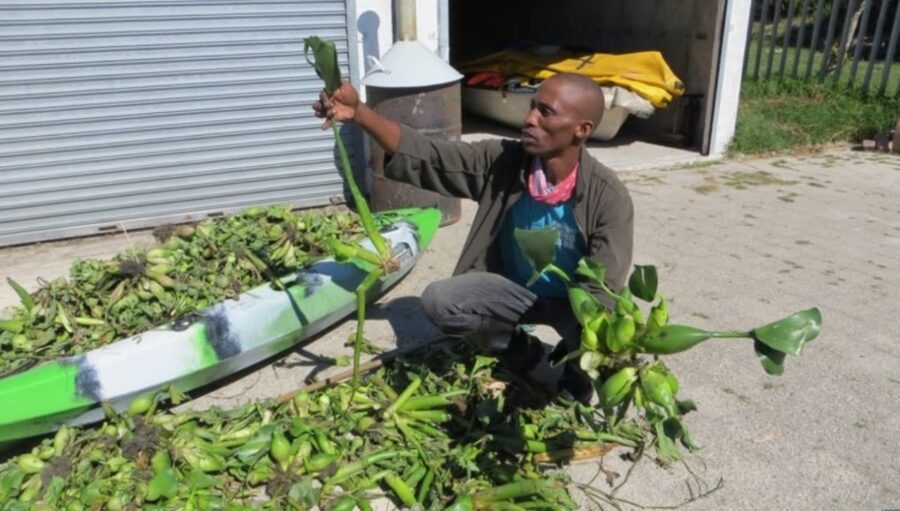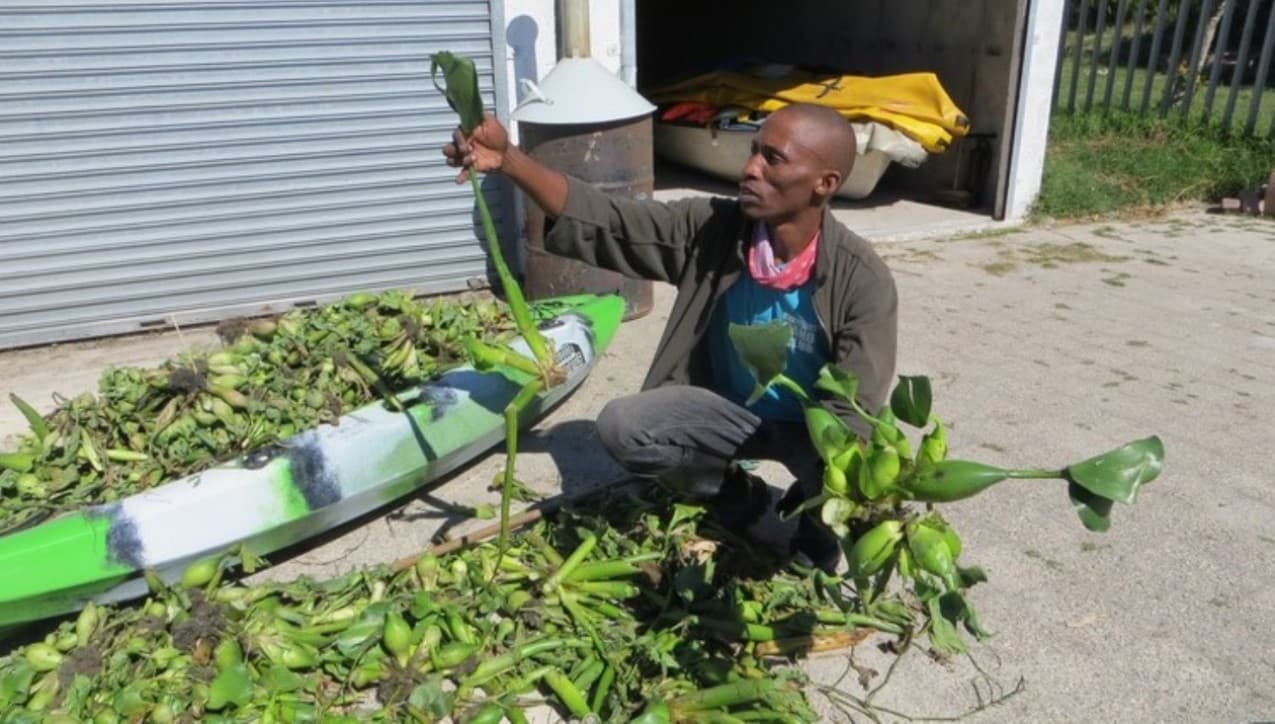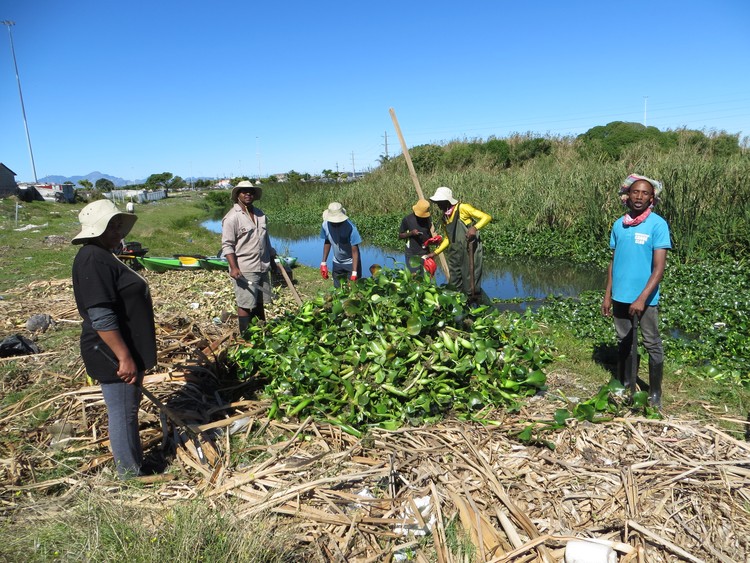
Canoeist brothers clean up Khayelitsha wetland
Hours spent every week removing invasive water hyacinth and rubbish.

Two Khayelitsha canoeists have started clearing invasive water hyacinths from the Blowy wetland in Makhaza, Cape Town, and making it into fertiliser for gardens. The pair spend hours every week removing rubbish from the wetland.
- Canoeist brothers Siyanda and Akhona Sopangisa spend hours every week clearing the Blowy wetland where they paddle.
- With the help of volunteers, they clear rubbish and also rip out alien water hyacinth which they turn into fertiliser.
- They hope to make a business selling the fertiliser for gardens.
Brothers Siyanda and Akhona Sopangisa founded the Khayelitsha Canoe Club in 2023. Along with more than 20 volunteers, the pair spend hours in the wetland each week picking up rubbish and pulling out the water hyacinth which is choking the wetland.
Paddling in Canoes
Working on foot or paddling in canoes, with rakes and gloves, they clean up nappies, plastic bags, clothes, bottles, car tyres and building materials that have been dumped in the wetland.
The brothers hand over the bottles and plastic bags to unemployed women who make a living from recycling. Other rubbish is stored at the Khayelitsha Wetlands Park, where the City of Cape Town collects it.
The brothers used to remove the water hyacinth and throw it away, but now they have found a use for it. They dry it and then burn it in a kiln to turn it into biochar – a sort of charcoal – which can be used as fertiliser in gardens.
“Our plan is to sell it to local gardeners who want to revitalise their gardens,” said Akhona Sopangisa.
He said: “We also aim to use the dry hyacinth to make hats, mats and bags and sell them to locals and tourists.”
Clean Wetland
Akhona Sopangisa said that when he and other canoeists returned to work in the wetland in June 2022, after a break during the Covid pandemic, they found the hyacinth had taken over. “The hyacinth covered the whole wetland and hindered us from canoeing and teaching youngsters to canoe,” he said.
“We googled, chatted to friends on social media and found out that we could turn it into biochar and make money out of it.”
Siyanda Sopangisa says water hyacinth and rubbish sometimes blocks the way of canoeists, including tourists who visit the area.
Water hyacinth is native to South America. According to the Agricultural Research Council, it has been described as “the world’s worst aquatic weed due to its invasive potential, negative impact on aquatic ecosystems, and the cost it necessitates to control it”.
He said a clean wetland invites birds and fish. “If the wetland is clean, animals thrive,” he said. Residents of the surrounding areas come to relax there and watch birds, he says. He said the wetland also provides small farmers with clean water for their cows and pigs and for their gardens, and it attracts tourists..
The brothers also use the wetland to train kids aged ten to 15 to swim and canoe on Saturdays and Sundays.
“The training helps them to identify rip currents and to swim safely,” he said.
“During the training, we teach kids about the importance of keeping the wetland clean and ask them to spread our message in the community.”
“A clean wetland is good for people like us who do recreational activities like canoeing or kayaking,” said Akhona Sopangisa.
ALSO READ: 30 Things the City Has Done to Clean up Cape Town’s Vleis, Rivers and Wetlands
Last month the volunteers and a group of tourists worked together to remove hyacinth, burn it and then take it to a nearby crèche where the biochar could be used as fertiliser. The tourists paid R400 for the experience, Akhona Sopangisa said.
“Tourists want to do activities with locals instead of just taking photos. We give the biochar to them, and they treat it as souvenirs,” he said.

Now the volunteers are looking for community gardens to test the efficiency of the biochar, he said.
“When we grew up, we loved nature and used to swim in the wetland for fun because it was clean,” said Siyanda Sopangisa. As the township grew, more people arrived in Makhaza and dumped dead animals and Blowy became polluted, said Siyanda.
He said, “After heavy rains, the dogs and cats would be scattered around and the filth would overflow into nearby houses and shacks, clog up storm water drains and cause a bad smell.”
He said he wished volunteers would get a stipend.
“A stipend would help us buy electricity, food and other basic necessities.”
Councillor Patricia van der Ross, Mayco member for community services and health, said the pair were part of the Recreation and Parks department wetland rehabilitation project. The department assisted them by providing storage space for their equipment.
She said the department cleaned the wetland “on an ad hoc basis” and had tried to reduce illegal dumping.
She said the City commended the dedication of the canoeists.
Asked about a stipend for the volunteers, Van der Ross urged them to register on the City’s unemployment database to enable them to be employed through the Expanded Public Works Programme.
